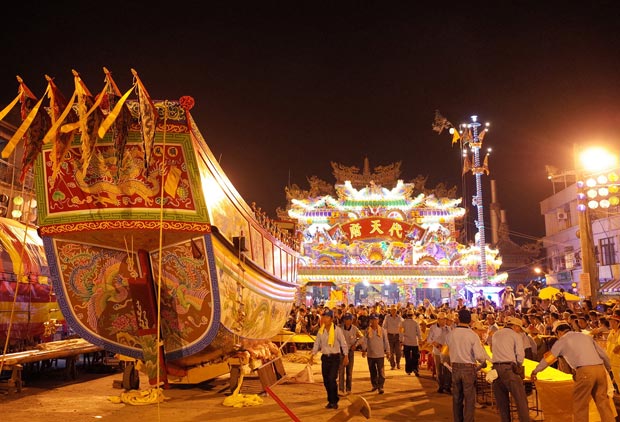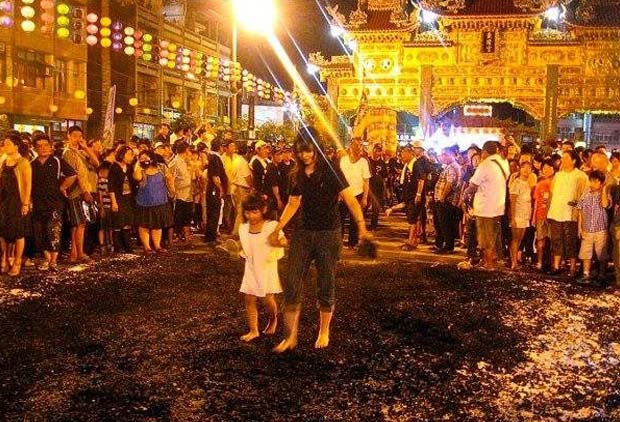Traveling in Taiwan
Firewalking in Taiwan for Beginners

Source:Taiwan Scene
Six years ago, I walked over a bed of hot coals. While I didn’t burn myself that night, I’ve been raking myself over the coals since.
Views
Firewalking in Taiwan for Beginners
By Taiwan Sceneweb only
The King Boat Festival is held every third Autumn in the town of Donggang, in southern Taiwan’s Pingtung county. The week-long festival begins with hundreds of spirit mediums self-flagellating with swords and spiked clubs, running pins through cheeks and back skin, balancing spiked balls on heads and eating burning incense (among other things). All this self abuse is done for one reason: To call in the Thousand-years grandfather, or “Qian sui ye”, a spirit normally residing at sea.
Once successfully called to land, Qian sui ye is feted in a weeklong parade around the Donggang area, where he is said to eradicate disease, poverty and pestilence. Like many celestial beings, he has mortal origins: a man who died at sea when his boat went up in flames and sank to the bottom of the Taiwan Strait. Thus, the festival ends with a showstopping event in which a life-size wooden boat, heaped with offerings and wishes, is burned on the beach.
 Source: Wikimedia Common, Author: Oliver515, CC BY-SA 4.0
Source: Wikimedia Common, Author: Oliver515, CC BY-SA 4.0
On the first night, after the spirit mediums have brought their celestial pen pals to earth and the parades have died down for the day, a massive night market pops up around the town’s golden-gated Donglong Temple. Inside the temple gate, one can view the boat that will be set alight or walk around the temple, although with the idols being paraded about town, the main altar is closed off. There is a long, rectangular esplanade between the gate and the temple.
As dusk closes in, the center of this paved expanse is covered with coals that are raked to an even depth and slowly heated.
The coals are not particularly fiery, more of a symbolic warmth without any serious risk of injury.
This is not always the case with firewalking in Taiwan, where firewalkers carrying idols at temple parades often injure their feet despite promises of protection from the gods. Many of the firewalkers are associated with various visiting temples, which come from all over Taiwan and abroad to participate. Others are merely interested locals. There is no rule that one must be a devotee to cross.
The only constant is this: Each time a festival is held, a different family in Donggang is put in charge.
(Many festivals in Taiwan are run using this system.)
I’d only been in Taiwan a couple of years when I attended my first King Boat Festival. That year the family in charge had been fairly modern in their beliefs. Everyone firewalked. Whole families crossed. Mothers helped their toddlers across. Old men hobbled across together, many quaffing Whisbih or Man Niu, local energy drinks (the former being slightly alcoholic) or Taiwan Beer. I crossed several times, as did many people, and all it took was a momentary pause to feel just how hot the coals actually were.
I returned three years later, by now having been in Taiwan over five years. Not yet fully aware of the ramifications of rotating hosts, I had no idea that, three years after my first firewalking experience in Donggang, the rules had changed.
As I stepped out confidently onto the burning coals, a man yelled “step back!”
I assumed he was worried I’d burn my tender foreign feet on the coals.
“Don’t worry about me,” I told the man before stepping out again. “I’ve done this before.”
Again, the man barked at me.
“You aren’t allowed!”
“Why?” I asked, stepping back again.
“Women can’t firewalk!” He replied.
“Nonsense,” I said. “I firewalked here three years ago.”
“No!” He insisted, and repeated that women were not permitted to firewalk.
“Other women walked three years ago too!”
I pulled out my phone and pulled up a photo of a mother and daughter walking across the coals in Donggang three years previously. I told him that just a few hours before I’d witnessed three female spirit mediums on the beach, summoning Qian sui ye along with their male counterparts.
 The king boat festival, Female crossing King Boat Festival. (Source: MyTaiwanTour)
The king boat festival, Female crossing King Boat Festival. (Source: MyTaiwanTour)
But the man refused to either look at the photo or listen to what I was saying.
“Well you can’t firewalk now!” He snapped. “Women aren’t permitted this year.”
My righteous feminist anger – so helpful and accurate in many situations – took over, my lizard brain crawling out and opening its toothy maw. It took over my eyesight – all I could see now was a vibrating scarlet – and my reflexes.
The tiny forebrain voice begging me not to do it was choked off: whisked away to where I could safely ignore it. My lizard brain stepped forward, and so did I.
I walked straight across those coals, shoulders back, head held high, confident that I was completely in the right when, in fact, I was completely in the wrong.
The man who’d admonished me merely looked away, dismissing me now as he’d dismissed my questions earlier. I took this as a sign of victory.
Again, I was wrong.
For years, I’ve told myself comforting stories about this incident, that I didn’t know who that man was, that there was no way for me to know if he was acting in some official capacity or merely a bystander who believed women should not firewalk.
That little voice has grown louder, though, reminding me that it doesn’t matter: he was a local, and obviously knew the festival well. He might have been just a random chauvinist, but even so, he would have known more about what was permissible and what was not.
Even if he hadn’t, as a foreign neophyte, the wise thing to do would have been to find out more information before resorting to open defiance.
Indeed, as I found out later, that particular year’s host family observed in more traditional ways, and were observing more traditional rules that the previous host family had relaxed. In all likelihood, the man wasn’t looking away because he’d lost and I’d showed him, but because he didn’t want to watch a stupid foreigner behaving disrespectfully in his town.
I don’t necessarily agree with the sentiment, but among the things I’ve learned after several more years in Taiwan is that I don’t have to respect the rules in order to follow them. I do have to respect that I am in a foreign culture where I might not always agree with the rules, but I choose to live here. This means making compromises, especially in areas where my opinion simply does not matter.
I am neither religious, nor a Daoist. If I believed in any gods at all, it wouldn’t be those bent on imposing a sexist world order. So, morally and ethically, I still feel as if I was in the right in this situation. That being said, the Donggang King Boat Festival was not “my” festival. And Daoism is not “my” religion.
In time, I may gain Taiwanese citizenship, and I might be able to call myself a new kind of Taiwanese. Even then, Donggang will not be my town, and my “rightness” will be irrelevant to the way the people of Donggang chose to celebrate their King Boat Festival.
Thinking back on this incident, I’m reminded of a story about a Western woman visiting the Middle East who finds herself at attending a camel race in which all except women are able to participate. The woman begs, cajoles and argues until the race organizers deign to allow her to ride. The moral of her story was that as strong, independent and equality-minded female travelers, our duty to challenge patriarchy where we find it, bringing gender equality to the world through leading by example.
My story has a different moral: While accepting my duty in challenging patriarchy, I see now that as a Western woman waltzing across a bed of hot coals when she’s been specifically asked not to do so challenges nothing. Instead, it’s an example of a foreigner barging into a new place and culture insisting they, not locals, know best.
It changed no minds, fostered no cultural connection.
There are other ways to challenge patriarchy: supporting local activists, engaging in fruitful conversations, making local friends, leading by example with empathy, and bowing out of situations when one simply cannot agree. I had other choices in that moment. I could have asked at the temple to see what was permitted. I could have left in protest of segregation of genders.
Instead, I chose a path that, if anything, hardened someone’s patriarchal beliefs rather than changing them.
Did I firewalk successfully that night? Sure. I managed to come away from the experience without burning my feet. But the real lesson branded on me would only come well after the fact.
Additional Reading
♦ Traveling in Taiwan as A Woman (But Not Only)
♦ From the Island of Women to #MeToo
♦ Taiwan: A Nation 'Half Empty' or 'Half Full'?
♦ Being Friendly is Not Enough
This article is reproduced under the permission of Taiwan Scene and terms of Creative Commons Attribution-NonCommercial-NoDerivs 4.0 Unported License (“CCPL”). It presents the opinion or perspective of the original author / organization, which does not represent the standpoint of CommonWealth magazine.

Original content can be found at the website of Taiwan Scene.
♦ Firewalking in Taiwan for Beginners
About the Author
Jenna Lyn Cody is a corporate trainer and writer living in Taipei. Her long-running blog, Lao Ren Cha contains her musings on women's issues in Asia, as well as travel, hiking, photography and food - with a few personal anecdotes thrown in.
About Taiwan Scene
Taiwan Scene is the online journal of MyTaiwanTour. We publish stories introducing readers to the culture, scenery and travel possibilities of our homeland, articles to help travelers make the most of their time in Taiwan, and occasional interviews with movers and shakers from Taiwan’s everexpanding creative scene.Prolonged exposure to Taiwan Scene may instill in readers a profound desire to experience Taiwan personally. If these cravings persist, please contact us immediately via [email protected].







